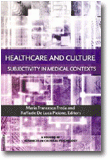
Healthcare and Culture
Subjectivity in Medical Contexts
Edited by:
Maria Francesca Freda, University of Naples Federico II
Raffaele De Luca Picione, University of Naples Federico II
A volume in the series: Advances in Cultural Psychology: Constructing Human Development. Editor(s): Jaan Valsiner, Niels Bohr Professor of Cultural Psychology, Aalborg University.
Published 2017
The book deals with current issues, pertinent every healthcare relationship. Changes in medicine as well as some constant aspects over time arise within a cultural ground and generate new questions and issues that are not only purely medical, but also bioethical, social, political, economic and psychological of course.
On the one hand, changes in medicine generate new questions for society, on the other hand, the society poses new questions to the medicine, new challenges, and in some cases they can conflict with consolidated models and practices. Never the progress of Western medicine and its therapeutic practices have been as significant as in the last decades but the increase of specific competence and effectiveness of medical treatments are not linearly translated into an increase of consensus, dialogue and alliance between medicine and society. How does psychology take on a position of interlocutor towards medicine and its transformations? How does Cultural Psychology, Health Psychology, Clinical Psychology confront themselves with the processes of meaning making generated by medicine?
The interest of the book is aimed to grasp the construction of processes of cultural, relational and subjective meaning in the dialogical encounter between medicine and society, between doctor and patient. The book intends to focus in particular on two specific plans: on the one hand, to present a reflection and analysis on contemporary medicine and its on‐going transformations of the healthcare relationship; on the other hand, to present and discuss experiences of intervention and possible models of intervention addressed to healthcare and doctor‐patient relationships during its crucial steps (consultation, formulation and communication of diagnosis, therapy, conclusion). The book’s purposes are aimed to discuss crucial and current issues on the borders between medicine and psychology: consensus and sharing, decision‐making and autonomy, subjectivity and narration, emotions and affectivity, medical semeiotics and cultural semiotics, training of physicians, and epistemological, theoretical and methodological issues.
CONTENTS
Series Editor’s Preface: Caring for Health Care: Cultural Processes in Medicine, Jaan Valsiner. Introduction: The Meaning Making Processes of Healthcare Relationship in the Current Scenario, Maria Francesca Freda and Raffaele De Luca Picione. PART I: HEALTHCARE RELATIONSHIP AS ARENA OF MEANING. FROM CULTURAL ISSUE TO SUBJECTIVE CONSTRUCTION OF ILLNESS. Medicine as a Complex Set of Cultural Systems of Meanings, Raffaele De Luca Picione. The Border Into Wonderland: When Words Between Doctor and Patient Is Not Enough, Jensine Nedergaard. Autonomy: A Concept at the Crossroads of Medicine and Psychology, Giovanni Guerra. The Role of the Meaning‐Making Process in the Management of Hereditary Angioedema, Livia Savarese, Maria Bova, Raffaella Falco, Maria Domenica Guarino, Gerarda Siani, Paolo Valerio, and Maria Francesca Freda. PART II: HEALTHCARE RELATIONSHIP AS ARENA OF TRANSFORMATION: FROM COMMUNICATION TO DIALOGUE. Psychological Scaffolding in the Healthcare Relationship: A Methodological Proposal, Maria Francesca Freda, Raffaele De Luca Picione, and Francesca Dicè. Breaking Bad News: Theory and Practice for Healthcare Professionals’ Training, Giulia Lamiani, Daniela Leone, Elaine C. Meyer, and Elena Vegni. Psychologists and Family Physicians in an Experience of Collaborative Care in Italy: An Effort Towards Integration and Against Stigma, Luigi Solano, Barbara Cordella, Michela Di Trani, Rosa Ferri, and Alessia Renzi. Clinical Psychology in Hospital Setting, Renzo Carli, Rosa Maria Paniccia, Silvia Policelli, and Andrea Caputo. PART III: MENTAL HEALTHCARE AS PARADIGMATIC ARENA TO UNDERSTAND THE COMPLEXITY OF HUMAN RELATION. From Psychopathology to Service. A New View of the Clinical Psychology Intervention, Sergio Salvatore, Claudia Venuleo, Valeria Pace, Marianna Puglisi, Mari Tandoi, Annalisa Venezia, Rossano Grassi, and Gianna Mangeli. Recovery, Paternalism and Narrative Understanding in Mental Healthcare, Tim Thornton. “Why Do You Then Not Shit?” Diagnosis and the Semiotic Sphere, Yair Neuman. PART IV: PREGNANCY AND MOTHERHOOD: A CHALLENGING ARENA FOR DIALOGUE BETWEEN MEDICINE AND PSYCHOLOGY. Birth Experience as Socially and Culturally Regulated Event, Kristiina Uriko. The Generative Function of a Healthcare System: Linking Meanings Between Chronic Illness and Motherhood, Giorgia Margherita, Maria Carlino, and Francesca Tessitore. Doctor‐Patient Relationship in Face of Grief/Mourning: The Case of Gestational Losses, Vivian Volkmer Pontes and Ana Cecília Bastos. Conclusion: Healthcare Relationship: An Open Space Dialogue in Search of Its Own Forms, Maria Francesca Freda and Raffaele De Luca Picione. About the Authors.
-
Paperback9781681236445
Web price: $45.04 (Reg. 52.99)
-
Hardcover9781681236452
Web price: $80.74 (Reg. 94.99)
- eBook9781681236469

- PSY031000 - PSYCHOLOGY: Social Psychology
- PSY007000 - PSYCHOLOGY: Clinical Psychology
- PSY012000 - PSYCHOLOGY: Education & Training
-
 Culture, Work and Psychology
Invitations to Dialogue
Culture, Work and Psychology
Invitations to Dialogue
-
 Deep Loyalties
Values in Military Lives
Deep Loyalties
Values in Military Lives
-
 Drama of Multilingualism
Literature Review and Liberation
Drama of Multilingualism
Literature Review and Liberation
-
 From Dream to Action
Imagination and (Im)Possible Futures
From Dream to Action
Imagination and (Im)Possible Futures
-
 Home in Transition
The Cultural Construction of Heimat
Home in Transition
The Cultural Construction of Heimat
-
 Making of Distinctions
Towards a Social Science of Inclusive Oppositions
Making of Distinctions
Towards a Social Science of Inclusive Oppositions
-
 Ornamented Lives
Ornamented Lives

